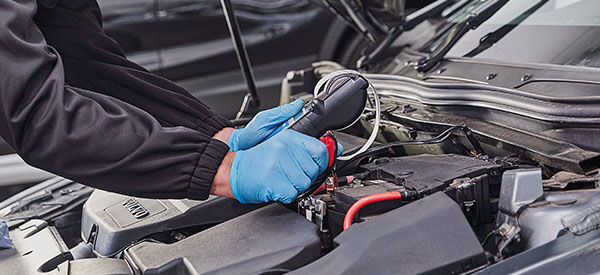Lithiumbatterien: Die Zukunft der Energiespeicherung
In recent years, the demand for energy storage has increased significantly as more people are turning to renewable energy sources like solar and wind power. The key to reliable and efficient energy storage lies in the development of high-performance batteries. Among the different types of batteries available in the market, lithium-ion batteries have emerged as the most promising technology for energy storage.
Lithium-ion batteries are rechargeable batteries that use lithium ions as a key component in the process of energy storage and release. These batteries have several advantages over traditional lead-acid batteries and other conventional battery technologies. For starters, they have a higher energy density, which means they can store more energy in a smaller package. They also have a longer lifespan and can be recharged several times before they need to be replaced.
The use of lithium-ion batteries in portable electronic devices like smartphones and laptops has become mainstream in recent years. However, their potential for energy storage on a larger scale is still being explored. With the growing demand for renewable energy sources, the development of efficient and reliable energy storage systems based on lithium-ion batteries has become a key research area.
One of the most significant advantages of lithium-ion batteries is their ability to store energy from intermittent sources like solar and wind power. These energy sources are unpredictable and can vary in intensity, making it difficult to rely on them as a primary source of energy. However, with the use of lithium-ion batteries, excess energy generated during peak hours can be stored and used during periods of low energy production.
Another advantage of lithium-ion batteries is their scalability. Lithium-ion batteries can be scaled up or down depending on the energy storage requirements. This means they can be used for small-scale applications like powering homes or large-scale applications like providing backup power for entire cities.
The adoption of lithium-ion batteries in the transportation sector is also on the rise. Electric vehicles (EVs) are becoming increasingly popular as people look for more environmentally friendly alternatives to traditional gasoline-powered cars. Lithium-ion batteries are the most commonly used type of battery in EVs due to their high energy density and reliability.
There are, however, some challenges associated with the use of lithium-ion batteries for energy storage. One of the main issues is the high cost of production. Lithium-ion batteries use rare and expensive materials like cobalt and lithium, which drive up the cost of production. However, with advancements in technology, the cost of lithium-ion batteries is expected to decline in the future.

Another challenge is the environmental impact of lithium-ion batteries. The mining and production of lithium and other materials used in these batteries can have negative environmental consequences. However, there are efforts underway to develop more sustainable methods of production and recycling of these materials.
In conclusion, lithium-ion batteries are the future of energy storage. With their high energy density, scalability, and ability to store energy from intermittent sources, they offer a reliable and efficient solution to the challenges of renewable energy storage. While there are still some challenges that need to be addressed, the continued research and development of lithium-ion batteries will pave the way for a more sustainable energy future.
-
 Locomotive starter batteries play a crucial role in the operation of trains. These batteries are responsible for providing the initial power necessary to start the locomotive's engine. Without a reliable starter battery, trains would not be able to move efficiently and effectively. In this article, we will discuss the importance of locomotive starter batteries, how they work, and the various...Weiterlesen
Locomotive starter batteries play a crucial role in the operation of trains. These batteries are responsible for providing the initial power necessary to start the locomotive's engine. Without a reliable starter battery, trains would not be able to move efficiently and effectively. In this article, we will discuss the importance of locomotive starter batteries, how they work, and the various...Weiterlesen -
 Lithium-ion batteries are an indispensable energy storage medium in our modern lives, playing a central role in everything from smartphones to electric cars. These small and powerful batteries are at the forefront of technological innovation due to their unique combination of high energy density, no memory effect and low self-discharge rate. 1. What are lithium-ion batteries? In short, lithium-ion batteries,...Weiterlesen
Lithium-ion batteries are an indispensable energy storage medium in our modern lives, playing a central role in everything from smartphones to electric cars. These small and powerful batteries are at the forefront of technological innovation due to their unique combination of high energy density, no memory effect and low self-discharge rate. 1. What are lithium-ion batteries? In short, lithium-ion batteries,...Weiterlesen -
 When it comes to boating, having a reliable and efficient battery is crucial. Whether you are planning a relaxing day on the water or embarking on an adventurous fishing trip, a marine starting battery can ensure that your watercraft is ready to go when you need it most. In this article, we will explore the benefits of using a marine...Weiterlesen
When it comes to boating, having a reliable and efficient battery is crucial. Whether you are planning a relaxing day on the water or embarking on an adventurous fishing trip, a marine starting battery can ensure that your watercraft is ready to go when you need it most. In this article, we will explore the benefits of using a marine...Weiterlesen -
 In today's fast-paced world, reliable and long-lasting power sources are a necessity. Whether it's for our smartphones, laptops, or even vehicles, we rely heavily on batteries to keep us connected and on the move. One such battery that has gained popularity in recent years is the 100Ah lithium battery, specifically the Lithium Iron Phosphate (LiFePO4) variant. The 100Ah LiFePO4...Weiterlesen
In today's fast-paced world, reliable and long-lasting power sources are a necessity. Whether it's for our smartphones, laptops, or even vehicles, we rely heavily on batteries to keep us connected and on the move. One such battery that has gained popularity in recent years is the 100Ah lithium battery, specifically the Lithium Iron Phosphate (LiFePO4) variant. The 100Ah LiFePO4...Weiterlesen -
 Industrielle Batterieladegeräte spielen eine entscheidende Rolle für das Funktionieren verschiedener Branchen weltweit. Diese leistungsstarken Geräte dienen zum Laden und Warten der Batterien, die wichtige Geräte und Maschinen in Bereichen wie Fertigung, Logistik und Transport antreiben. Für Unternehmen ist es wichtig, die Bedeutung und Leistungsfähigkeit industrieller Batterieladegeräte zu verstehen, um einen unterbrechungsfreien Betrieb sicherzustellen und die Produktivität zu maximieren. ...Weiterlesen
Industrielle Batterieladegeräte spielen eine entscheidende Rolle für das Funktionieren verschiedener Branchen weltweit. Diese leistungsstarken Geräte dienen zum Laden und Warten der Batterien, die wichtige Geräte und Maschinen in Bereichen wie Fertigung, Logistik und Transport antreiben. Für Unternehmen ist es wichtig, die Bedeutung und Leistungsfähigkeit industrieller Batterieladegeräte zu verstehen, um einen unterbrechungsfreien Betrieb sicherzustellen und die Produktivität zu maximieren. ...Weiterlesen -
 With the rise in environmental consciousness and the need for sustainable transportation alternatives, electric scooters have gained immense popularity in recent years. These compact and eco-friendly vehicles offer a convenient mode of transportation for short distances. At the heart of an electric scooter lies its battery, which powers the vehicle efficiently and sustainably. The battery is the lifeblood of...Weiterlesen
With the rise in environmental consciousness and the need for sustainable transportation alternatives, electric scooters have gained immense popularity in recent years. These compact and eco-friendly vehicles offer a convenient mode of transportation for short distances. At the heart of an electric scooter lies its battery, which powers the vehicle efficiently and sustainably. The battery is the lifeblood of...Weiterlesen -
 Einleitung Beim Antrieb von Lokomotiven ist die Starterbatterie eine der wesentlichen Komponenten. Diese Batterie dient als erste Energiequelle für den Motor der Lokomotive und ermöglicht so das Starten und die Fahrt. In diesem Artikel besprechen wir die Bedeutung der Starterbatterie, ihrer Komponenten und wie man sie pflegt, um eine optimale Funktion zu gewährleisten...Weiterlesen
Einleitung Beim Antrieb von Lokomotiven ist die Starterbatterie eine der wesentlichen Komponenten. Diese Batterie dient als erste Energiequelle für den Motor der Lokomotive und ermöglicht so das Starten und die Fahrt. In diesem Artikel besprechen wir die Bedeutung der Starterbatterie, ihrer Komponenten und wie man sie pflegt, um eine optimale Funktion zu gewährleisten...Weiterlesen

